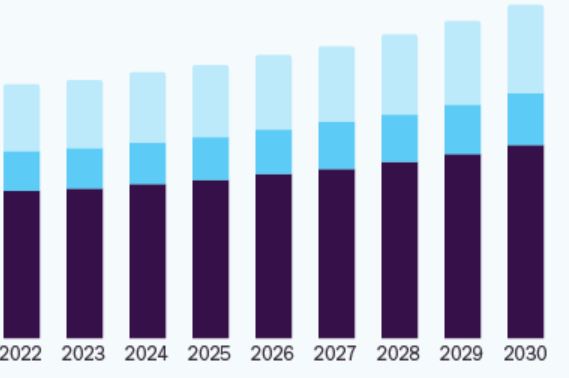Introduction:
The Global Tourism Industry is a dynamic and ever-evolving sector, with various players contributing to its growth and development. In this article, we will delve into some of the prominent companies that shape the landscape of the tourism industry, exploring their market size, market share, future outlook, growth rates, and opportunities. The companies under our scrutiny are Expedia Group Inc., Booking Holdings Inc., Airbnb Inc., Trip.com Group Limited, Agoda.com International Ltd., and Marriott International Inc.
1. Expedia Group Inc.:

Expedia Group Inc. stands tall as one of the giants in the online travel agency (OTA) realm. As of the latest available data, Expedia's market size is estimated to be around $30 billion. The company boasts a diverse portfolio of travel brands, including Expedia, Hotels.com, and Vrbo. With a focus on offering a one-stop-shop for travelers, Expedia provides services ranging from hotel reservations and flights to car rentals and vacation packages.
Expedia Group's market share in the OTA space is significant, capturing approximately 15% of the global online travel market. Despite facing stiff competition, the company continues to expand its reach through strategic acquisitions and partnerships, ensuring a steady growth rate.
The future outlook for Expedia remains promising, with an increasing trend of consumers preferring online platforms for travel bookings. As technology advances and travel becomes more accessible, Expedia is poised to capitalize on this trend and maintain its position as a leader in the industry.
2. Booking Holdings Inc.:

Booking Holdings Inc., another major player in the tourism industry, operates a constellation of travel brands, including Booking.com, Priceline, and Kayak. The company's market size is currently estimated at $70 billion, showcasing its extensive reach and influence in the market.
Booking Holdings holds a substantial market share, accounting for nearly 20% of the global online travel market. The platform's user-friendly interface and vast accommodation options contribute to its popularity among travelers.
With a growth rate exceeding the industry average, Booking Holdings continues to adapt to emerging trends. The company's focus on innovation, coupled with its strong market presence, positions it well for sustained growth in the future.
3. Airbnb Inc.:

Airbnb, a disruptor in the traditional hospitality sector, has revolutionized the way people travel and experience accommodation. While not a publicly traded company, Airbnb's estimated valuation places it at around $100 billion, reflecting its significant market presence.
Known for its unique offerings, including stays in private homes and experiences hosted by locals, Airbnb has carved a niche for itself in the travel & tourism industry. The platform's user base continues to grow, with millions of users globally.
As the travel landscape evolves, Airbnb's future outlook remains optimistic. The company's agility and ability to cater to the changing preferences of travelers position it as a formidable player in the market, presenting new opportunities for growth.
4. Trip. com Group Limited:

Trip. com Group Limited, a Chinese travel service provider, operates under various brand names, including Ctrip, Trip. com, and Skyscanner. The company's market size is estimated to be around $20 billion, reflecting its strong presence in the Asian and global travel market.
Trip. com Group commands a notable market share, particularly in the Asia-Pacific region, where it is a dominant force in online travel services. The company's comprehensive offerings, including accommodation, transportation, and vacation packages, contribute to its success.
With the Asia-Pacific region witnessing a surge in outbound tourism, Trip. com Group is well-positioned to capitalize on this trend. The company's expansion strategies and technological innovations further enhance its growth prospects.
5. Agoda International Ltd.:

Agoda, a subsidiary of Booking Holdings Inc., specializes in offering accommodation services. Although specific market size data for Agoda.com alone is not readily available, its parent company's influence and resources contribute to its significant market presence.
Agoda caters to a global user base seeking diverse accommodation options. The platform's focus on providing competitive prices and a seamless booking experience has solidified its position in the industry.
As part of Booking Holdings, Agoda benefits from the conglomerate's overall growth and stability, ensuring a positive outlook for the future.
6. Marriott International Inc.:

Marriott International Inc., a hospitality giant, operates a vast network of hotels and resorts worldwide. With a market size of approximately $50 billion, Marriott is a key player in the traditional accommodation sector.
While Marriott's market share may be distributed among various hotel chains, its global presence and brand recognition contribute to its prominence. The company caters to a diverse range of travelers, from luxury seekers to budget-conscious individuals.
Marriott's future outlook remains optimistic, with the company adapting to changing consumer preferences and incorporating sustainability initiatives. The resilience of the hospitality sector, coupled with Marriott's strategic positioning, presents ample growth opportunities.
Conclusion:
In conclusion, the tourism industry is shaped by a diverse array of players, each contributing to its vibrancy and growth. As technology continues to play a pivotal role in shaping travel experiences, companies like Expedia, Booking Holdings, Airbnb, Trip.com Group, Agoda.com, and Marriott International are at the forefront, driving innovation and meeting the evolving needs of travelers. With promising future outlooks and a commitment to adapting to industry trends, these players are likely to remain pivotal in shaping the future of the tourism landscape.


